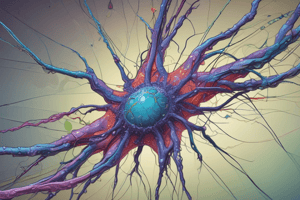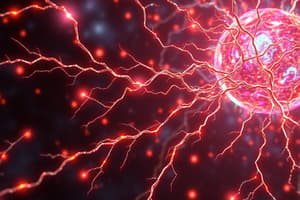Podcast
Questions and Answers
Which of the following best describes the function of vasopressin (ADH) acting on V2 receptors?
Which of the following best describes the function of vasopressin (ADH) acting on V2 receptors?
- Stimulating vascular contractions to increase blood pressure.
- Acting on the last part of the nephron and being sensitive to ADH to regulate water reabsorption. (correct)
- Regulating smooth muscle relaxation and vasodilation.
- Facilitating uterine contraction and milk ejection.
What is the consequence of defects in V2 receptors, according to the text?
What is the consequence of defects in V2 receptors, according to the text?
- X-linked diabetes insipidus. (correct)
- Overproduction of breast milk.
- Increased vasoconstriction.
- Enhanced uterine contractions.
Angiotensin II primarily affects which physiological process?
Angiotensin II primarily affects which physiological process?
- Stimulation of uterine contraction.
- Regulation of vasoconstriction and aldosterone release. (correct)
- Regulation of smooth muscle relaxation.
- Pain modulation.
What is the primary effect of vasoactive intestinal peptides (VIP)?
What is the primary effect of vasoactive intestinal peptides (VIP)?
Which of the following describes the function of oxytocin?
Which of the following describes the function of oxytocin?
Where are rhodopsin receptors primarily located?
Where are rhodopsin receptors primarily located?
Benzodiazepines and barbiturates are primarily used for what purpose?
Benzodiazepines and barbiturates are primarily used for what purpose?
What effect does the influx of chloride ions into a neuron typically have on its electrical state?
What effect does the influx of chloride ions into a neuron typically have on its electrical state?
What is the immediate effect of potassium ions leaking out of a neuron?
What is the immediate effect of potassium ions leaking out of a neuron?
When a neurotransmitter stimulates a neuron, leading to an influx of positive ions such as $Na^+$ or $Ca^{2+}$, what is the resulting change in the neuron's membrane potential called?
When a neurotransmitter stimulates a neuron, leading to an influx of positive ions such as $Na^+$ or $Ca^{2+}$, what is the resulting change in the neuron's membrane potential called?
Which of the following processes makes a neuron more electronegative, thus inhibiting its function?
Which of the following processes makes a neuron more electronegative, thus inhibiting its function?
What type of receptors are coupled with G-proteins and are commonly found in neuropeptides?
What type of receptors are coupled with G-proteins and are commonly found in neuropeptides?
How does the activation of the $G_i$ system in GABA-B receptors lead to the inhibition of neuronal function?
How does the activation of the $G_i$ system in GABA-B receptors lead to the inhibition of neuronal function?
Which process is directly facilitated by the opening of chloride channels in a neuron's membrane?
Which process is directly facilitated by the opening of chloride channels in a neuron's membrane?
What is the primary mechanism through which GABA-A receptors inhibit neuronal function?
What is the primary mechanism through which GABA-A receptors inhibit neuronal function?
Flashcards
Vasopressin (ADH) - V1 Receptors
Vasopressin (ADH) - V1 Receptors
Present in the vascular system. Stimulates vascular contractions.
Vasopressin (ADH) - V2 Receptors
Vasopressin (ADH) - V2 Receptors
Found in the last part of the nephron, sensitive to ADH. Defects lead to X-linked diabetes insipidus.
Angiotensin II location
Angiotensin II location
Present on arterioles, in the venous system, and in the Zona glomerulosa.
Angiotensin II function
Angiotensin II function
Signup and view all the flashcards
Opiates function
Opiates function
Signup and view all the flashcards
Vasoactive Intestinal Peptides (VIP) function
Vasoactive Intestinal Peptides (VIP) function
Signup and view all the flashcards
Oxytocin function
Oxytocin function
Signup and view all the flashcards
Rhodopsin receptors location
Rhodopsin receptors location
Signup and view all the flashcards
Benzodiazepine and Barbiturates use
Benzodiazepine and Barbiturates use
Signup and view all the flashcards
GABA receptors function
GABA receptors function
Signup and view all the flashcards
GABA-A receptors action
GABA-A receptors action
Signup and view all the flashcards
GABA-B receptors action
GABA-B receptors action
Signup and view all the flashcards
Stimulation of a Neuron (1)
Stimulation of a Neuron (1)
Signup and view all the flashcards
Inhibition of a Neuron (2)
Inhibition of a Neuron (2)
Signup and view all the flashcards
Inhibition of a Neuron (3)
Inhibition of a Neuron (3)
Signup and view all the flashcards
Study Notes
- Neuropeptides have serpentine receptors coupled with G-proteins.
Vasopressin (ADH)
- It is a hormone, not a receptor.
- V1 Receptors: Present in the vascular system and stimulate vascular contractions.
- V2 Receptors: Present in the last part of the nephron and are sensitive to ADH.
- Defects to V2 receptors can lead to X-linked diabetes insipidus.
Angiotensin II
- Serpentine Receptors are present on arterioles, in the venous system, and in the Zona glomerulosa.
- Regulates vasoconstriction and aldosterone release.
Opiates
- Serpentine receptors are involved in pain modulation and euphoria.
- Enkephalins and endorphins.
Vasoactive Intestinal Peptides (VIP)
- Serpentine receptors regulate smooth muscle relaxation, glandular secretion, and vasodilation.
Oxytocin
- Serpentine receptors stimulate uterine contraction and milk ejection.
Other Information
- Rhodopsin receptors are found in the eye rods and cones.
- Benzodiazepine and Barbiturates are used as sedatives.
- GABA receptors inhibit the function of neurons.
- When a drug binds to the Cl channels of GABA-A receptors, Cl floods into the cell, making it highly negative, which inhibits function.
- When a drug binds to the serpentine receptors of GABA-B receptors, the Gi system is activated, and potassium (positive charge) leaks out of the cell.
- This makes the cell highly negative and it loses its function.
Ways to Stimulate/Inhibit a Neuron
-
Upon stimulation from a nearby neuron, a neurotransmitter is released.
-
The channel opens upon binding with the channel of the neuron ends.
-
As the channels open, the influx of positive ions (Na+ or Ca2+) occurs.
-
The influx of positive ions changes the neuron's potential, reducing the electronegativity of the cell and depolarizing the cell.
-
The second way to stimulate/inhibit neurons is when the neurotransmitter is released, it will couple with the ion channels, thus stimulating the channel.
-
The stimulated channel allows K+ to leak out.
-
Due to the loss of K+ ions, the cell becomes more electronegative and is electrically inhibited or hyperpolarized.
-
The third way to stimulate or inhibit a neuron is when the transmitter is released, it binds to and stimulates the ion channel.
-
When the ion channel opens, it allows the passage of chloride ions.
-
As the chloride ion concentration is high outside the cell, the extracellular chloride ions move inside the cell when the channels open.
-
As chloride ions move inside the cell, the cell becomes more electronegative, hyperpolarizing the cell.
Studying That Suits You
Use AI to generate personalized quizzes and flashcards to suit your learning preferences.




